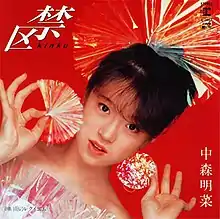Kinku (song)
"Kinku" (禁区, lit. "Forbidden Zone") is the sixth single by Japanese entertainer Akina Nakamori. Written by Masao Urino and Haruomi Hosono, the single was released on September 7, 1983, by Warner Pioneer through the Reprise label. It was also the third single from her first greatest hits album Best Akina Memoires.[1][2]
| "Kinku" | ||||
|---|---|---|---|---|
 | ||||
| Single by Akina Nakamori | ||||
| from the album Best Akina Memoires | ||||
| Language | Japanese | |||
| English title | Forbidden Zone | |||
| B-side | "Ame no Requiem" | |||
| Released | September 7, 1983 | |||
| Recorded | 1983 | |||
| Genre | ||||
| Length | 3:48 | |||
| Label | Reprise Records | |||
| Composer(s) | Haruomi Hosono | |||
| Lyricist(s) | Masao Urino | |||
| Producer(s) | Yoshiaki Tanaka | |||
| Akina Nakamori singles chronology | ||||
| ||||
| Music videos | ||||
| "Kinku" (Live) on YouTube | ||||
Background
Nakamori performed the song on the 34th Kōhaku Uta Gassen, making her debut on NHK's New Year's Eve special.[3] In 2010, she re-recorded the song for the pachinko machine CR Nakamori Akina: Utahime Densetsu ~Koi Moni Dome nara~ (CR中森明菜・歌姫伝説〜恋も二度目なら〜, CR Akina Nakamori: Utahime Legend ~If Love Is For the Second Time~).[4]
Chart performance
"Kinku" became Nakamori's third No. 1 on Oricon's weekly singles chart and sold over 511,000 copies.[5][6]
Track listing
| No. | Title | Lyrics | Music | Arrangement | Length |
|---|---|---|---|---|---|
| 1. | "Kinku" ((禁区, "Forbidden Zone")) | Masao Urino | Haruomi Hosono |
| 3:48 |
| 2. | "Ame no Requiem" (Ame no Rekuiemu (雨のレクイエム, "Requiem of the Rain")) | Rui Serizawa | Kōji Tamaki | Hagita | 4:43 |
| Total length: | 8:31 | ||||
| No. | Title | Lyrics | Music | Length |
|---|---|---|---|---|
| 3. | "Kinku (Live Version)" ((禁区(LIVE VERSION))) | Urino | Hosono |
Cover versions
- Pai Bing-bing covered the song on her 1984 album Zuìxīn dōngyáng jīnqǔ (最新東洋金曲). Her version is a mix of Taiwanese, Mandarin, and Japanese.[7]
- Hong Kong singer Sara Lee covered the song in Cantonese as "Liàn'ài rèxiàn" (戀愛熱線, "Love Hotline") on her 1985 album Gàobié lǐlìruǐ (告別李麗蕊, Farewell to Li Lirui).
- Leslie Cheung covered the song in Cantonese as "Dì yī cì" (第一次, "The First Time") on his 1985 album Wèi nǎi zhōngqíng (為妳鍾情, My Love for You). He also covered it in Mandarin as "Bèiqì mìngyùn" (背棄命運, "Betrayal of Fate") on his 1986 Taiwan album Yīngxióng běnsè dāngnián qíng (英雄本色當年情, The True Nature of the Hero) and Mandarin-language Hong Kong album Àimù (愛慕, Love).
- Morio Agata covered the song on his 1993 cover album Imitation Gold.[8]
References
- "中森明菜『禁区』". Idol.ne.jp. 2019-01-03. Retrieved 2022-08-20.
- "中森明菜/禁区". SoundFinder. Retrieved 2022-08-20.
- "34th Kōhaku Uta Gassen History". NHK. Retrieved 2022-08-20.
- "CR中森明菜 歌姫伝説~恋も二度目なら~". P-World. Retrieved 2022-08-20.
- "禁区 | 中森明菜". Oricon. Retrieved 2022-08-20.
- "中森明菜". Yamachan Land. Archived from the original on 2011-05-24. Retrieved 2022-08-20.
- "白冰冰 最新東洋金曲". Fuki World. Retrieved 2022-08-20.
- "イミテーション ゴールド | あがた森魚". Tsutaya. Retrieved 2022-08-20.
External links
- Official website
- "Kinku" at MusicBrainz (list of releases)
- "Kinku" at Discogs (list of releases)
This article is issued from Wikipedia. The text is licensed under Creative Commons - Attribution - Sharealike. Additional terms may apply for the media files.